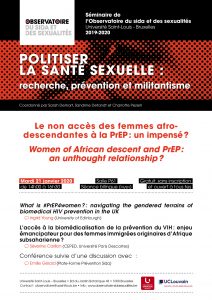Le non accès des femmes afrodescendantes à la PrEP: un impensé?
Women of African descent and PrEP: an unthought relationship?
Avec la Plate-Forme Prévention Sida / Séance bilingue (FR-EN)
What is #PrEP4women? Navigating the gendered terrains of biomedical HIV prevention in the UK
Ingrid Young (University of Edinburgh)
In the UK, women at risk of HIV are largely – although not exclusively – from African communities. This presentation will reflect on PrEP provision in the UK and what it means for women from African communities. I will first chart out the policy journeys for PrEP in Scotland and England, reflecting on how the orientation of PrEP policy has failed to adequately address the needs of women as PrEP users. I will pay attention to how and where ‘women’ has been deployed in PrEP policy, health practice and activist narratives, and consider who this ‘woman’ is imagined to be. I will then focus on work done in the last few years by community activists to address the gap in provision and support for women, drawing on community roundtables, awareness campaigns and peer education interventions.
Dr Ingrid Young is a Chancellor’s Fellow in the Centre for Biomedicine, Self & Society at the University of Edinburgh. Her research looks at sexual and reproductive health, and how biotechnologies are translated within and across communities. She is particularly interested in how experiences of and inequalities across gender, sexualities, race and technologies shape sexual health and wellbeing. She has been working on and around pre-exposure prophylaxis (PrEP) in the UK since 2011, with a particular interest in access, critical literacies and PrEP activism. She is currently the co-chair of the Scottish Interdisciplinary Research in Sexual Health (IReSH) Network, which works collaboratively with clinical, community and research partners.
L’accès à la biomédicalisation de la prévention du VIH: enjeu émancipateur pour des femmes immigrées originaires d’Afrique subsaharienne ?
Séverine Carillon (CEPED, Université Paris Descartes)
Depuis la mise à disposition en France d’un traitement préventif contre le VIH/sida (la PrEP) s’adressant aux personnes non infectées et à haut risque d’acquisition de l’infection par le VIH, la question de l’accès des populations originaires d’Afrique subsaharienne à ce médicament est au cœur des préoccupations des acteurs de la lutte contre le sida. Ces populations immigrées sont parmi les plus affectées par l’épidémie de VIH en France. Des études récentes montrent qu’une partie des contaminations a lieu après l’arrivée en France en lien avec des conditions de vie précaires. Dès lors, diverses initiatives visant au déploiement de la PrEP parmi ces populations sont mises en place. Nous proposons dans cette communication d’analyser la façon dont est pensé l’accès des immigré·es à la PrEP en France et ainsi d’en montrer les limites et les impensés. L’analyse est fondée sur une ethnographie de l’accès à la PrEP des immigré·es conduite en Ile-de-France, associant observations de la mise en œuvre des programmes de prévention et entretiens semi-directifs auprès de professionnel·les de santé, responsables associatifs et femmes immigrées.
Séverine Carillon est anthropologue, chercheure contractuelle au Ceped, à Paris. Elle travaille sur les inégalités d’accès aux soins en France et en Afrique.
Présentations suivies d’une discussion avec Emilie Gérard (Plate-Forme Prévention Sida).
La Plate-Forme Prévention Sida est une association belge francophone travaillant sur la prévention du VIH-sida et des autres infections sexuellement transmissibles (IST) en Wallonie et à Bruxelles.

Séminaire 2019-20
Politiser la santé sexuelle : recherche, prévention et militantisme
Séance 2
Date et horaire
Mardi 21 janvier
14h-16h30
Lieu
Université Saint-Louis – Bruxelles
Salle P61
Contact
Sarah Demart
Tél. : +32 (0)2 211 79 05
E-mail : sarah.demart@usaintlouis.be



